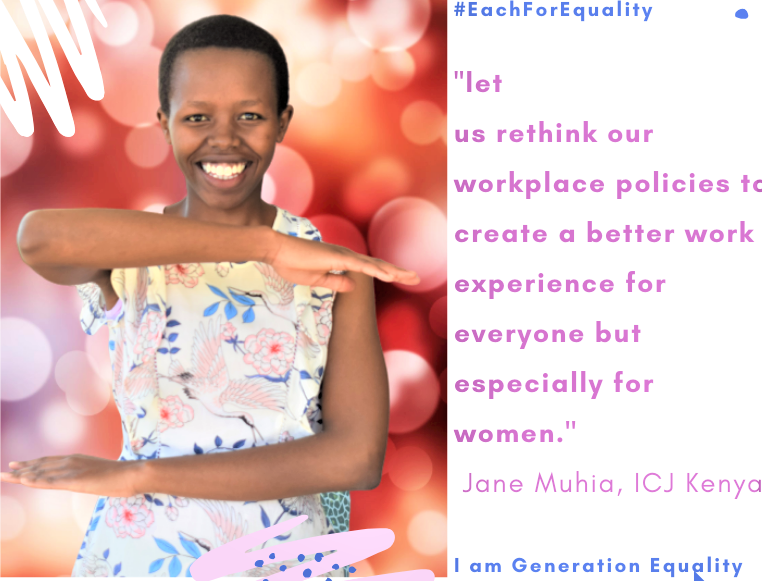Jane Muhia
The International Women’s Day 2020 was on 8th March 2020. The theme this year was Each for Equal, which speaks to individual acts and collective individualism.
“Individually, we’re all responsible for our own thoughts and actions – all day, every day. We can actively choose to challenge stereotypes, fight bias, broaden perceptions, improve situations and celebrate women’s achievements. Collectively, each one of us can help create a gender equal world.”
I like this theme because it speaks to small individual acts that collectively will be greatly impactful.
Beyond the 8th we must think of keeping the energy of the day, the messages, the promises of the day alive so that by the next 8th of March we can look back and see the steps we have made towards an equal world. We must take actual steps towards challenging stereotypes, fighting biases, improving situations, broadening perceptions and celebrating women’s achievements. Look around you at home, at school, at work and start on small incremental steps.
At this point let me share my passion with you. I am passionate about ensuring a conducive environment for women at the work place. I am an advocate for a positive work culture generally but on this occasion, I speak on women issues.
I recently came across a quote that really resonated with me: ‘instead of work life balance, we wanted to create a life work blend where life has to come first and work has to blend into it.” This statement, resonates with me because we often say work-life balance suggesting that work comes before life and we forget we were living before we started working and we need to be living to work.
The World’s Development Agenda is geared towards sustainability as posited in the Sustainable Development Goals. Gender Equality is a standalone Goal (SDG 5) but there are other aspects of it in many other SDGs. The emphasis for me concerning economic development is the triple bottom line approach, that is, profit, people and planet, which means that businesses are not expected to only focus on making profits, rather they have to be responsive to the people who work for them and the community around them and also ensure they are responsible over their impact on the environment.
Among the many issues concerning women at the workplace I wish to highlight; menstrual health and hygiene, pregnancy, maternity leave, lactation spaces and sexual harassment.
Menstrual health and hygiene
I have recently followed conversations around menstrual health championed by Janet Mbugua[1] which has really got me questioning the norms around menstrual health and how the subject is treated in most spaces. There are the bigger questions on policy around access to sanitary products to those who are unable to afford them or talking about the many challenges women face during their periods, that might seem out of our reach and might take a while to put in place and implement.
However, there are other changes that we can start influencing at our work places such as policies that allow for menstrual leave for women who have extremely painful periods and allow them to may be work from home if they can or just allow them a day or two off altogether, which goes a long way in supporting them.
Proper disposal facilities are also something that has also come up, even in conversations with my friends in different spaces. Although there are more sustainable products being developed around the world, they might not be accessible to most due to various factors. Consequently, for now what we can do is ensure proper disposal facilities are available at our workplaces. Speak up and be proactive about letting your administrator or office building caretaker or manager or whoever else may be in charge of making the arrangements with sanitation companies to ensure a practical schedule for collection and disposal of sanitary waste.
Pregnancy
Pregnancy is not reason for any form of discrimination at the work place. It is expressly prohibited in the constitution, legislation as well as in international law. We must therefore advocate for policies at our work places that ensure that women are not unfairly denied opportunity because of the very natural responsibility of carrying and bearing life.
Maternity Leave
The law is very clear on three months maternity leave, with full pay and therefore denying maternity leave and not according full benefits to women who are on maternity leave is a violation of their rights.
Provision of Lactation rooms at the workplace
What most of us do not know is that all employers are obligated by the Health Act to provide lactation spaces for women at the work place. There is also a Breastfeeding Mother’s bill[2] awaiting parliamentary approve that seeks to go into further details of these obligations, prescribe penalties and also expand the scope of obligations to baby changing facilities in public places. The Ministry of Health has also developed guidelines for securing a breastfeeding friendly environment at the workplace.[3]
However, it is sad to hear of women who have to express milk in rest rooms, their cars or those who stop breastfeeding or expressing milk altogether because there are no measures in place, once they go back to work, to facilitate this vital part of child care and growth.
Consequently, we must advocate for policies that allow women to breastfeed or express milk comfortably and in a clean environment. Let us encourage flex time policies at our work places to allow women transition back to work easily and pursue their careers, while still being mindful of the fact that they are first time mums or new mums or mums to several children and they need support and understanding as they adjust to their new roles and juggle all the responsibilities.
Sexual Harassment
Sexual Harassment remains prevalent all around us and more so in the workplace. We have come a long way as most survivors are now able to speak out and we must not lose that momentum.
We must, however champion the development of policies around sexual harassment at the work place that clearly define sexual harassment and sets out the procedures of reporting and consequences of such behaviour to ensure justice for the survivors.
Conclusion
Are women asking for special treatment? No, they are just asking for an opportunity to do that which nature has exclusively vested in them and still be economically productive.
Change is only possible if we take personal responsibility to change and ask for better in our small spaces and cumulatively change in our small spaces will be change in our country and eventually in the world.
Do not sit around and wonder about how you can change the world instead start with the small things you see and experience every day and be consistent and you will start seeing it happen.
Jane Muhia serves as the Programme Officer, Economic Governance; Democratic Governance and Rule of Law Programme. Jane is an advocate of the High Court of Kenya who is passionate about constitutional law issues, development and the law, law and policy development and legal empowerment.
[1] Kenyan Media Personality, Founder Inua Dada Foundation and Author ‘My First Time’2019
[2] http://kenyalaw.org/kl/fileadmin/pdfdownloads/bills/2017/BreastfeedingMothersBill_2017.pdf (accessed on 5th March 2020
[3] http://www.health.go.ke/wp-content/uploads/2018/11/GUIDELINES-FOR-WORKPLACE-SUPPORT-FOR-WOMEN-SOFTY-COPY-SAMPLE-converted.pdf (accessed on 5th March 2020)











